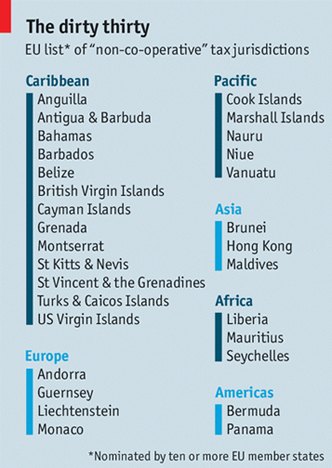Tax blacklists
The naming and shaming is fraught with folly:
Blacklists have been a feature of tax diplomacy ever since an
internationally coordinated assault on tax havens began in the late
1990s. One of the first lists, produced by a global
anti-money-laundering body, included, among others, Panama. The Central
American country rattled the only sabre it had-its canal-and was
promptly taken off the list after some western governments squealed that
their companies might lose engineering contracts.
 Politicised
though blacklisting may be, it is no less popular today. Pressure to
name and shame is high in a time of post-crisis austerity. The latest
such list, published in June by the European Union (EU), points the
finger at 30 countries it views as "non-co-operative" on tax. Politicised
though blacklisting may be, it is no less popular today. Pressure to
name and shame is high in a time of post-crisis austerity. The latest
such list, published in June by the European Union (EU), points the
finger at 30 countries it views as "non-co-operative" on tax.
The targets (see box) have cried foul. Far from being exhaustively
researched, the list is an aggregation of national lists: It includes
any country blacklisted by ten or more EU members. Not only does that
strike many as arbitrary, but the criteria for inclusion differ from EU
state to state: Some consider a low tax rate alone sufficient grounds,
others require secrecy and opacity too. The most avid blacklisters are
financial minnows such as the Baltic States and Bulgaria; Germany and
Britain are among those with no entries.
Worse, mistakes appear to have been made in the totting-up-and left
unrectified even when pointed out. Guernsey is on the list by virtue of
being blacklisted by precisely ten EU countries-but one of those,
Poland, has a beef not with Guernsey but nearby Sark. Guernsey's
government says that it made clear before the list was published that it
has no legal authority for Sark in tax matters, but that this fell on
deaf ears.
The list is at odds with reality in other ways, too. On it are Nauru
and Niue, two Pacific microstates. Both have had problems with dodgy
shell banks in the past, to be sure, but these were shut down a decade
ago under international pressure. Today, Nauru's only formal financial
institution, according to an anti-money-laundering group, is a branch of
Western Union, a money transmitter, in a hardware store. Niue's
financial sector is by this measure at least twice as big-it boasts no
fewer than two Western Union branches, plus a commercial bank. "It is
hard to imagine complex tax-evasion schemes being run from such places,"
says Jason Sharman, an expert in offshore finance at Griffith University
in Australia.
Public perceptions
Though blacklists lack credibility among tax cognoscenti, they do
matter. They affect public perceptions and give NGOs a rod with which to
beat perceived offenders. Moreover, inclusion on a list damages more
than just reputation. The information is fed into commercial risk
software, making banks that use it less willing to deal with blacklisted
countries. Few will want to open local outposts in places regularly
denounced as financial rogues.
A list compiled by one country or region is often used as an input
for those of others, compounding the problem. That can overlook the
progress made by some places to shed their pariah status by, for
example, agreeing to exchange tax information systematically. The OECD,
a rich-country club which oversees that process, has called the EU list
"unfortunate."
The more advanced jurisdictions on the list, such as Guernsey and
Bermuda, are particularly annoyed. Though no angels, they have made
progress and now meet more global tax and anti-money-laundering
standards than many OECD countries do.
Bermuda points out that at least five of its eleven EU blacklisters
have themselves failed to meet international tax obligations. Indeed, if
the EU had assessed its own members honestly, it is hard to imagine the
Netherlands, Luxembourg and Ireland-home to particularly rococo tax
schemes attractive to American tech groups-not being on it. Some might
add Britain, too.
The European Commission has responded to the criticism by arguing
that the list should not be viewed as a central blacklist, since the
batching of the 30 names is merely a "consolidation" of national lists.
That is disingenuous, given that officials themselves refer to it as
"the pan-EU list." They insist the removal or addition of countries is
down to individual member states, not Eurocrats.
One official says the list is already having a positive effect, by
making offshore centres more willing to engage with small EU countries
that have blacklisted them. After all, who knows where closer
co-operation between Guernsey and Estonia could lead?
As pressure has mounted, however, Brussels has backtracked. At a
meeting with the 30 ostracised states last month, it agreed to make
clearer reference to efforts that some of them have made to adhere to
new tax-transparency standards-though it is not clear if it will ditch
the "non-co-operative" label. Officials have assured Guernsey that it is
not considered a tax reprobate, but the island remains on the list-at
least until it is formally updated later this year. "This sort of thing
can make you feel like your efforts are never rewarded," sighs Steve
Wakelin, who handles Guernsey's international relations.
- The Economist
|

